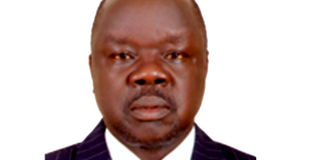NCHE: Amend the Act and review the appointments of serving Vice-chancellors

Fabiano Okware
What you need to know:
NCHE needs to get support from parliament to restore its confidence through the enactment of appropriate laws.
For the last two weeks, the media has been awash with Uganda university expired programmes as purportedly published on the NCHE website.
I would like to raise my voice following concerns by Mr Alan Tacca in his article in Daily Monitor of June 4, “Professors adopt hawker mindset”. I believe this will also add to the voice of my colleague, Dr Zadock Ekimwere in his article, “NCHE: restore confidence in higher education programmes”, whose considered version of the word “expiry” seem to be considered as appropriate, hence adopted by Council as “Due for Review”. The UOTI Act, 2003 (with amended Act 2006), section 7(2&3) states that the National Council shall recommend two members from among themselves from whom the President shall appoint the Chairperson of the National Council and the National Council shall elect a Vice-Chairperson from among themselves respectively.
Since time immemorial, the serving Vice-Chancellors happen to be appointed Chairpersons of the National Council and also occasionally Chairpersons of Council Committees such as Quality Assurance Committee of Council! In the management perspective, more so, Corporate Governance, this raises a perceived conflict of interest!
In my opinion, the serving Vice-Chancellors or Heads of university and Other Tertiary institutions should not be appointed as Chairpersons in both the main and Committees of Council.
They have a lot of work in their docket with surmountable problems in running their institutions. To allow them in the NCHE affairs of the regulator means them transferring their weaknesses, hence making the regulator ineffective! Preferably the retired but not tired Vice-Chancellors or Heads of other Tertiary institutions are considered for appointment to such positions.
These categories of persons are bound to be objective and have the necessary experience to task and hold the serving persons accountable and responsible. This is a new job and assignment they will hold with diligence. They will stand against any compromise to quality and poor performance of institutions.
To restore confidence both to the heads of institutions and Council, first the heads of institutions should accept the re-assessment, evaluation and monitoring by the NCHE as their marketing tool so that they are considered competitive globally. For them to get money, they must spend money! This is the essence of marketing. Institutions are established not only to survive, but to grow, develop and prosper.
The NCHE needs to get support from parliament to restore its confidence through the enactment of appropriate laws. Parliament should encourage the enactment of laws such as those in good corporate governance to help the managers of these institutions for better performance.
As a member of Institute Corporate Governance of Uganda (ICGU), the Institute presented a draft bill through Hon Mama Atim- Ogwal to present as a private member’s bill to Parliament with an aim of enacting into law so that managers in public and private institutions appreciate the foundation, the pillars of good corporate governance in exhibiting ethical behavior towards effective and efficient performance of their institutions.
The six pillars of good corporate governance; accountability, transparency, trust, integrity, professionalism and excellence (attire) should ideally be exhibited by every head of an institution, taking their institutions to a higher level in order to compete globally.
Such a law when enacted will be mandatory for heads of institutions to adhere on governance, for this is a critical component that the NCHE always emphasizes during the inspection, visitation and verification exercises in relation to sustainability.
All in all, the heads of universities and other tertiary institutions should uphold and embrace the re-assessment, inspection, verification of their programmes and facilities by the NCHE in an effort to remain globally competitive.
Today, institutions are not operating in a vacuum but in a rapid, turbulent economic, technological environment. There are shifting content needs and ever customer changing preferences, requiring institutions to be abreast with the ever environment changes.
Dr Fabiano Okware is an independent tertiary higher education institution, business and management consultant.




